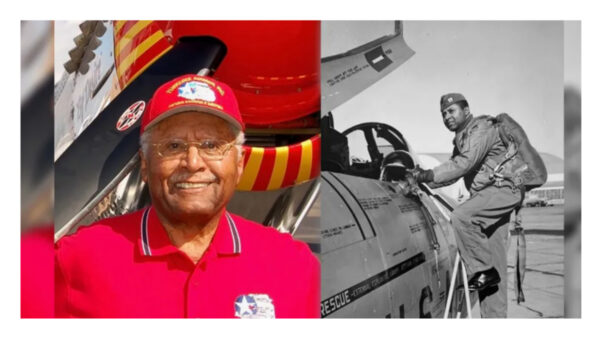One of the last surviving original Tuskegee airmen has died, leaving a legacy of courage and civil rights activism behind for generations to admire. The highly decorated 95-year-old wore his Distinguished Flying Cross, Bronze Star, WWII Victory Medal and many other honors with pride and integrity, defining for a nation what a true “hero” should be.

Lt. Col. Asa Herring, the first African-American squadron commander in the United States military, made his transition on Friday, May 27, surrounded by his family in his Phoenix home, the Arizona Republic reports.
His granddaughter Jenna Herring said in tribute to his legendary life, “He was a wonderful man and has the greatest legacy to leave behind, not only for American history but for our family.”
She continued, “He just lived a life of honor. We always looked up to him. He was just the greatest grandfather. To me, he was the epitome of Black excellence and the American dream. You know, he was able to overcome so much, and still through all his struggles, he always remained neutral through politics. It was never black and white, it was always do the right thing.”
According to another granddaughter, Herring was modest. Despite all of his accolades, he rarely spoke about his military service and the history he and his fellow airmen brothers made unless someone asked. Martina Blasingame said, “When we hung out if you wanted to know stories about his past and his life and his Tuskegee career, you had to ask him questions to pry it out of him.”
Blasingame remembered, “Otherwise, he was grandpa mode and we played puzzles and ate ice cream together.”
Herring didn’t have to boast about his career; others did. The Air Force proudly commemorated his life and career as a public servant, noting how he put his life on the line for a country at a time when many in the nation did not treat him as an equal citizen.
Born on Oct. 3, 1926, in Dunn, North Carolina, Herring entered into this world a little over 60 years after slavery had come to an end. A bright teenager, he graduated high school at 16 years old. He had to wait before he could enter the military, a dream of his because the age to be considered was 18. At the age of 17, he passed the Army Air Corps written examination, and on Dec. 27, 1944, when he was old enough, he entered into active duty as an aviation cadet.
Herring was accepted into the Tuskegee Institute’s Aircraft Maintenance program.
“World War II ended before he finished his training. Germany had surrendered and the ‘Tuskegee Experiment’ was one of many flying schools that were soon to be eliminated,” Stephen Delgado, 56th Fighter Wing Public Affairs from the United States Air Force reported. “He left the Army Air Corps in 1946, but his love of aviation and a profound change in policy would bring him back.”
Herring once said, “I did not want to be in a segregated military, so that is the principal reason I left. I also wanted to further my education.”
“I had graduated from several top-notch technical schools but was unable to obtain employment with an airline or a fixed-base operator,” he continued. “Then President Harry Truman issued Executive Order 9981, ending the policy of racial segregation. With the end of segregation and the Air Force becoming a separate branch of the military, I volunteered for military service in 1949 and stayed until 1970.”
He once said, “Joining the AirForce and being able to fly was a turning point in my life.”
Over his career, he served in England, Germany, Korea and Vietnam, where he flew 350 combat missions. He said the perils of combat, his three tours of duty at Luke Air Force Base and the time he served in Vietnam gave him a different perspective about race and personal limitations.
“You know you can do something, but people won’t let you do it,” Herring remarked. “Once you are in a combat situation such as in Vietnam, you get a different perspective. I realized that we were in it together and color didn’t matter.”
His numerous awards and honors include: Distinguished Flying Cross; Bronze Star; Air Medal w/ 13 Oak Leaf Clusters; Air Force Commendation Medal; Good Conduct Medal (U.S. Army and Air Force); WWII Victory Medal; National Defense Service Medal with 1 BSS; Armed Forces Reserve Medal; USAF Outstanding Unit Award; Meritorious Unit Commendation (USAF); Air Force Longevity Service and the Award Ribbon with 4 Oak Leaf Clusters.
Blasingame shared her grandfather “suffered from dementia” during the end of his heralded life. Even with the debilitating disease, his long-term memory was excellent, she said.
“Even at the end of his life, he remembered his past and he could tell you several stories even though they were from decades ago. His short-term memory wasn’t so great but his long-term memory, just being able to tell you about his past, was sharp and on point,” the granddaughter remembered.
Herring’s descendants are asking all who wish to honor Asa D. Herring Jr.’s life and legacy to donate to Archer-Ragsdale Arizona Chapter’s various scholarship funds to help further the education of high school students looking to pursue careers in aviation, science, technology, engineering, math and various other disciplines.


